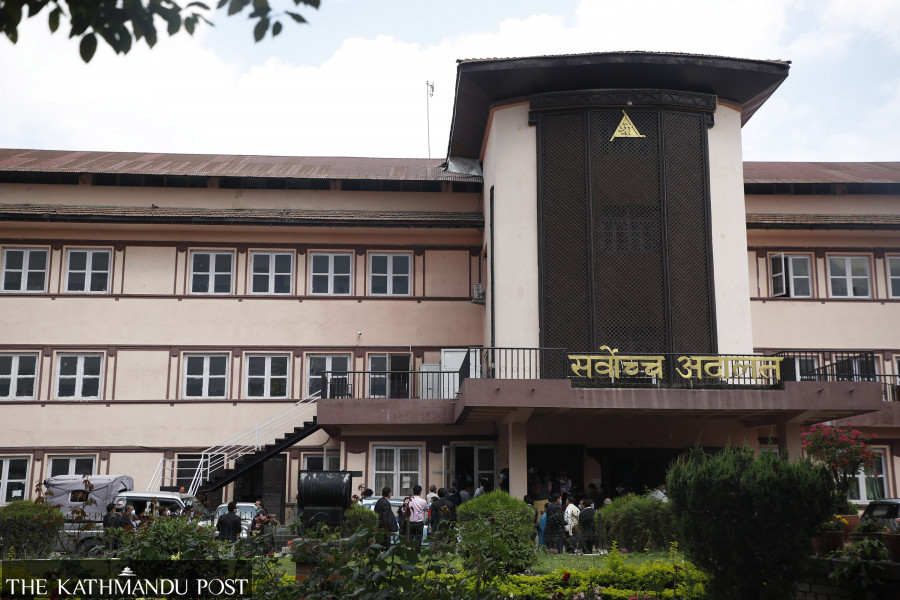National
Justice seekers hit by judicial deadlock
Hearings of over 700 cases affected in the last three days as justices boycott bench in protest against Chief Justice Rana.
Binod Ghimire
Amid non-cooperation from his Supreme Court colleagues, Chief Justice Cholendra Shumsher Rana constituted 11 benches on Wednesday and allotted 278 cases to them.
One such was his single bench and another five-member Constitutional Bench he led. However, except Rana’s bench, no other benches conducted hearings leading to the deferral of 273 cases.
“Only the chief justice-led single bench conducted hearings and passed verdicts and orders on Wednesday,” Baburam Dahal, spokesperson for the Supreme Court, told the Post. “However, all the available justices were present in the full court called by the chief justice that passed a condolence motion on the demise of former justice Sharada Prasad Pandit.”
All Supreme Court justices have been boycotting benches starting Monday while the associations of lawyers also have decided not to show up in the hearings demanding Rana’s resignation. They have been claiming that his stepping down is a must for any reforms in the judiciary as he has failed to maintain integrity of the one of three organs of the state. Rana, on the other hand, has refused to step down.
By fixing his single bench and conducting hearings on five different cases on Wednesday, Rana has given a message that he is not going to budge. Rana has said he will continue to perform his responsibilities.
Suffering amid the tussle between the chief justice and legal fraternity are the general justice seekers. Hearings on 705 cases, some of which are pending for around a decade, have been affected due to the ongoing crisis in the judiciary.
Not a single hearing took place on Monday and Tuesday as well, with 15 justices resorting to a pen-down protest against Rana. Altogether 432 cases were in the docket for the two days.
And for Wednesday, Rana had scheduled hearings on 278 cases but no hearing was held at 10 benches including the Constitutional Bench. Even habeas corpus petitions have been affected due to the protest by justices.
“It is very unfortunate that the justices are refusing to conduct hearings even on habeas corpus petitions,” Swagat Nepal, an advocate, told the Post. “Imagine the situation of the people who are in detention, probably illegally. And they are suffering just because the justices, whose responsibility is to deliver justice, are refusing to conduct hearings.”
The Supreme Court keeps its door open even during major holidays like Dashain and Tihar for habeas corpus petitions to ensure that no individual has to be in illegal detention even for a day.
Supreme Court officials say at least two-three habeas corpus petitions are assigned to benches every day. There were three such petitions to be heard on Wednesday. Two of them were in Rana’s bench, in which show cause orders were issued, but the one in justices Prakash Dhungana and Manoj Kumar Sharma’s division bench couldn’t be decided.
A habeas corpus petition by Pratap Bista, who is in detention of the Metropolitan Police, Kathmandu, was scheduled for hearing on Monday on the division bench of justices Prakash Man Singh Raut and Sushma Lata Mathema, but they boycotted the bench.
On Wednesday, the petition was assigned to the division bench of Justices Dhungana and Sharma. “This is the height of anarchy in the judiciary. The justices are failing the public,” said Nepal.
Though various associations of lawyers have decided not to participate in the hearing process until Rana quits, not all lawyers are happy with the boycott decision. They say boycotting the bench is irresponsible. “The justices and the different associations of lawyers are behaving like trade unions,” Ganesh Giri, an advocate at the Supreme Court, told the Post. “We are against halting hearings under any pretext. We will start a protest against the Bar and the justices if they refuse to adopt alternative modes of protest.” He said the Supreme Court, which on several occasions has issued rulings not to hamper essential services; itself is hampering justice delivery to the hundreds of people.
The lawyers at the Supreme Court say the boycott will further delay the clearance of the cases that are pending for years. According to the annual report of the court from fiscal year 2019-20, as many as 35,981 cases were in the Supreme Court in the year including 24,180 from the previous year. The court could clear only 31.2o percent of leaving baggage of 24,756 cases for the next year. As many as 2,058—around nine percent, of the cases are older than five years.
“Such protests will only increase the workload in the court delaying justice delivery,” said Giri. “Justice delayed is justice denied.” Those, who are supporting the boycott, however, have a different say. They argue that the boycott was their last resort after Rana turned a deaf ear to their concerns. “Unexpected but necessary turns of events have led to the present situation,” said Lalmani Poudel, general secretary of Nepal Bar Association, in a statement. “We urge you to have patience and support our actions aimed at bringing reforms to the judiciary. We are sorry for the inconvenience caused to the service seekers.”
While the Supreme Court justices have decided to continue their protest against Rana, they too have felt that boycotting all the benches for long isn’t a good move.
“It wouldn’t be right to fully boycott the benches for long,” a justice at the Supreme Court told the Post on condition of anonymity. “We will sit on Thursday to find an alternative to the present mode of protest.”




 20.12°C Kathmandu
20.12°C Kathmandu














